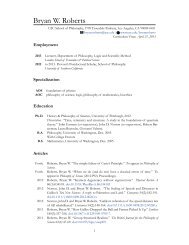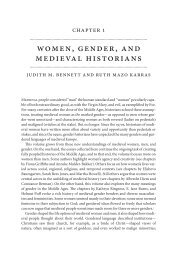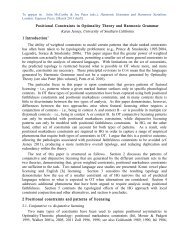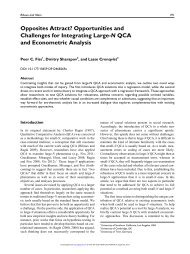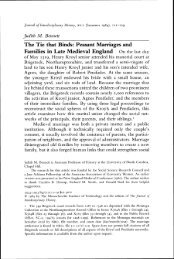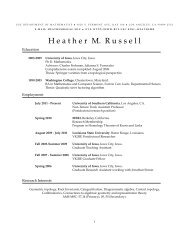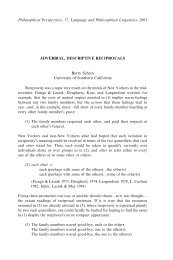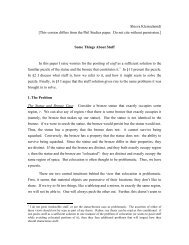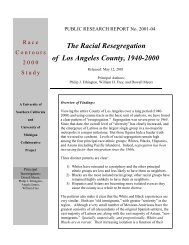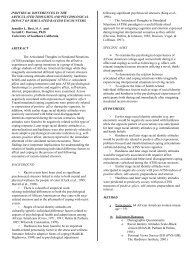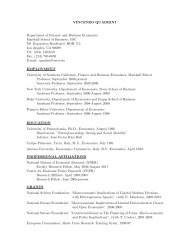The Diffusion of Ideas over Contested Terrain - Personal World Wide ...
The Diffusion of Ideas over Contested Terrain - Personal World Wide ...
The Diffusion of Ideas over Contested Terrain - Personal World Wide ...
You also want an ePaper? Increase the reach of your titles
YUMPU automatically turns print PDFs into web optimized ePapers that Google loves.
#2144-ASQ V49 N4-December 2005—file: 49401-fiss<br />
results <strong>of</strong> the considerable empirical research on the effects<br />
<strong>of</strong> ownership concentration have been inconclusive (Demsetz<br />
and Lehn, 1985; Kang and Sørensen, 1998). Our theoretical<br />
perspective on diffusion as well as our empirical results provide<br />
further evidence that ownership concentration may not<br />
sufficiently capture the constellations <strong>of</strong> diverging interests<br />
among and within ownership categories. By teasing apart<br />
ownership effects in our data, we found considerable support<br />
for owner interests that are context dependent and change<br />
<strong>over</strong> time. <strong>The</strong>se findings contribute to the literature on the<br />
diffusion <strong>of</strong> practices as well as the growing literature that<br />
examines sociocultural and behavioral factors in corporate<br />
g<strong>over</strong>nance relations (e.g., Bühner et al., 1998; Ahmadjian<br />
and Robinson, 2001; Westphal and Zajac, 2001; Davis and<br />
Useem, 2002; Zajac and Westphal, 2004).<br />
Our findings have a number <strong>of</strong> specific implications. First, we<br />
documented the important and evolving role played by<br />
domestic banks in the diffusion <strong>of</strong> a shareholder value orientation<br />
in German companies. Given the central role <strong>of</strong> domestic<br />
banks in the German system <strong>of</strong> corporate finance, this<br />
shift could have important consequences. Specifically, in their<br />
role as the providers <strong>of</strong> “patient capital” that do not demand<br />
immediate market returns, German universal banks have historically<br />
been characterized as more efficient than Anglo-<br />
American banks (e.g., Francke and Hudson, 1984). <strong>The</strong> close<br />
ties between German banks and firms have been viewed as<br />
allowing the banks to <strong>over</strong>come information asymmetries,<br />
resulting in an efficient system <strong>of</strong> monitoring and replacing<br />
firm managers. In support <strong>of</strong> this view, Gorton and Schmid<br />
(2000) found that during the 1970s and 1980s, a German<br />
firm’s performance improved to the extent that domestic<br />
banks held equity in the firm and were able to influence firm<br />
strategy. But the monitoring role <strong>of</strong> German banks is to some<br />
extent predicated on their adherence to the traditional model<br />
<strong>of</strong> “patient capital.” If German banks no longer follow this<br />
model but instead become active proponents <strong>of</strong> a shareholder<br />
value orientation among those firms in which they have<br />
investments, this could plausibly reduce their ability to establish<br />
and maintain the close ties and trust relationships that<br />
have traditionally defined German corporate finance. If this<br />
happens, the former system <strong>of</strong> monitoring may have to be<br />
replaced with another g<strong>over</strong>nance system in which the stock<br />
market plays a more central role, such as the threat <strong>of</strong><br />
take<strong>over</strong>s in a market for corporate control.<br />
In this study, we have focused on the antecedents <strong>of</strong> adoption<br />
and implementation <strong>of</strong> a shareholder-oriented g<strong>over</strong>nance<br />
model. Future research could extend this focus by<br />
examining the consequences <strong>of</strong> an emerging g<strong>over</strong>nance<br />
regime for different stakeholder groups. For example, does<br />
the adoption <strong>of</strong> a shareholder value orientation in Germany<br />
really lead to greater returns for stockholders (Fiss and Zajac,<br />
2005)? If so, are these greater returns achieved primarily at<br />
the expense <strong>of</strong> other stakeholder groups, such as debt holders<br />
and employees, or does this change in g<strong>over</strong>nance lead<br />
to increased corporate performance, resulting in greater benefits<br />
for all corporate stakeholders? Answers to these questions<br />
would provide valuable insights into the current debate<br />
528/ASQ, December 2004



